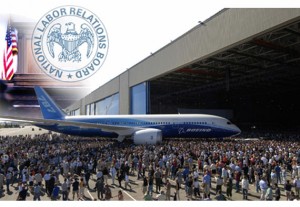LOCAL
Judge rejects Boeing effort to dismiss charges
 SEATTLE (June 30) — In a 19-page ruling issued today, Judge Clifford Anderson rejected “in its entirety” Boeing’s motion to dismiss the NLRB case challenging its retaliatory transfer of the second 787 line and associated supply-chain work to South Carolina.
SEATTLE (June 30) — In a 19-page ruling issued today, Judge Clifford Anderson rejected “in its entirety” Boeing’s motion to dismiss the NLRB case challenging its retaliatory transfer of the second 787 line and associated supply-chain work to South Carolina.
Although many of Boeing’s arguments were rejected based on the need for further evidence, there are several significant points in today’s ruling.
1) The judge rejects Boeing’s claim that its CEO’s comments could not be construed as unlawful threats.
2) Citing settled Board law, he likewise rejects as a matter of law two of Boeing’s key defenses. Judge Anderson rules that Boeing was not entitled to place the second line in South Carolina because the second line was allegedly “new work” and thus Puget Sound workers were not yet harmed by the move. He also flatly rejects Boeing’s contract defense holding that a “contract clause allowing the employer to locate work as it sees fit does not authorize that employer to do so for a reason prohibited by the Act.”
Both claims have been pillars of Boeing’s increasingly public and political defense for the discriminatory transfer of work from Puget Sound to South Carolina.
3) Finally, he rejects Boeing’s attempt to narrow the proposed remedy of retaining the second 787 line in Everett. The Judge notes that this is the standard Board remedy and it is too early in the proceedings to make this judgment.
In addition, all of Boeing’s pre-trial efforts to derail this case were rejected in their entirety.
“This reaffirms what we have said all along – that Boeing provided no facts or legal basis as to why the case should be dismissed,” said Connie Kelliher, spokeswoman for Machinists District 751. “The case will now proceed to a trial, as it should, on its merits.”
The hearing will resume at 9 a.m. on Wednesday, July 6.





